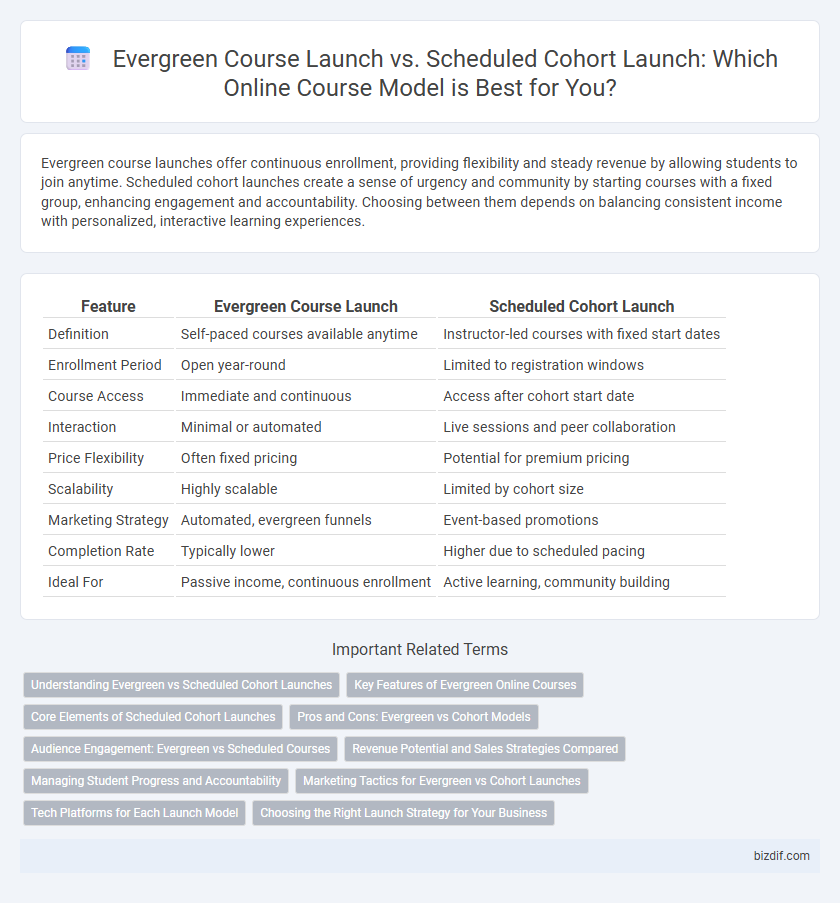Evergreen course launches offer continuous enrollment, providing flexibility and steady revenue by allowing students to join anytime. Scheduled cohort launches create a sense of urgency and community by starting courses with a fixed group, enhancing engagement and accountability. Choosing between them depends on balancing consistent income with personalized, interactive learning experiences.
Table of Comparison
| Feature | Evergreen Course Launch | Scheduled Cohort Launch |
|---|---|---|
| Definition | Self-paced courses available anytime | Instructor-led courses with fixed start dates |
| Enrollment Period | Open year-round | Limited to registration windows |
| Course Access | Immediate and continuous | Access after cohort start date |
| Interaction | Minimal or automated | Live sessions and peer collaboration |
| Price Flexibility | Often fixed pricing | Potential for premium pricing |
| Scalability | Highly scalable | Limited by cohort size |
| Marketing Strategy | Automated, evergreen funnels | Event-based promotions |
| Completion Rate | Typically lower | Higher due to scheduled pacing |
| Ideal For | Passive income, continuous enrollment | Active learning, community building |
Understanding Evergreen vs Scheduled Cohort Launches
Evergreen course launches enable continuous enrollment, providing learners with immediate access and allowing creators to generate consistent revenue without fixed start dates. Scheduled cohort launches involve releasing courses at predetermined times, fostering community interaction and structured learning experiences through group engagement. Understanding these models helps instructors choose between flexible access or timed group dynamics to optimize student outcomes and business goals.
Key Features of Evergreen Online Courses
Evergreen online courses provide continuous enrollment with automated content delivery, enabling learners to progress at their own pace without fixed start dates. Key features include on-demand access, consistent availability, and scalable marketing funnels that minimize instructor involvement after initial setup. This model supports passive income generation and seamless integration with email sequences and evergreen webinars for ongoing student engagement.
Core Elements of Scheduled Cohort Launches
Scheduled cohort launches revolve around fixed start dates, fostering a sense of urgency and community engagement among learners. Core elements include structured timelines, live interactive sessions, and cohort-based peer support, enhancing accountability and motivation. This approach leverages social learning dynamics to improve course completion rates and learner satisfaction.
Pros and Cons: Evergreen vs Cohort Models
Evergreen course launches offer continuous enrollment and passive income, making them ideal for scalable, self-paced learning but may lack personalized interaction and community engagement. Scheduled cohort launches foster a sense of urgency and accountability through live interactions and group dynamics, enhancing student motivation and completion rates but requiring more intensive facilitation and limited enrollment periods. Balancing scalability and engagement is key when choosing between evergreen and cohort models for online course creation.
Audience Engagement: Evergreen vs Scheduled Courses
Evergreen courses provide continuous access, allowing students to start anytime, which supports consistent engagement but may lack real-time interaction. Scheduled cohort launches create a structured timeline, fostering live discussions, peer interaction, and increased motivation through deadlines. Audience engagement tends to be higher in scheduled cohorts due to shared experiences and timely feedback, while evergreen courses benefit from flexible participation.
Revenue Potential and Sales Strategies Compared
Evergreen course launches generate consistent revenue streams by allowing students to enroll anytime, leveraging automated sales funnels and evergreen email marketing for steady income. Scheduled cohort launches create urgency and scarcity, often resulting in higher short-term sales spikes and opportunities for live engagement and upselling. Revenue potential depends on business goals: evergreen models suit passive income strategies, while cohort launches optimize for peak sales periods and community-building.
Managing Student Progress and Accountability
Evergreen course launches facilitate self-paced learning by allowing students to progress independently, which often requires automated tools to monitor completion and provide timely reminders. Scheduled cohort launches create structured timelines with set deadlines, enhancing accountability through group interactions and instructor-led checkpoints. Implementing progress tracking dashboards and periodic assessments in both models helps maintain student engagement and course completion rates.
Marketing Tactics for Evergreen vs Cohort Launches
Evergreen course launches rely on continuous, automated marketing tactics such as email drip campaigns, evergreen webinars, and targeted paid ads optimized for long-term conversion, ensuring steady enrollment without live event constraints. Scheduled cohort launches utilize high-intensity, time-sensitive marketing strategies including live webinars, limited-time bonuses, countdown timers, and community engagement to create urgency and foster a sense of exclusivity. Marketing for evergreen courses emphasizes scalable funnels and consistent lead nurturing, while cohort launches focus on bursts of engagement and leveraging FOMO (fear of missing out) to drive immediate sign-ups.
Tech Platforms for Each Launch Model
Evergreen course launches benefit from tech platforms like Kajabi and Teachable that support automated drip content and perpetual enrollment, ensuring continuous student access without manual intervention. Scheduled cohort launches utilize platforms such as Zoom combined with Thinkific or Mighty Networks to facilitate live sessions, real-time interaction, and community engagement during specific time frames. Choosing the right tech stack aligns with course delivery style, maximizing learner experience and operational efficiency for each launch model.
Choosing the Right Launch Strategy for Your Business
Evergreen course launches provide continuous enrollment, ideal for businesses seeking steady passive income and flexibility in student start dates. Scheduled cohort launches create engagement through fixed start times, fostering community interaction and higher completion rates, beneficial for courses requiring real-time feedback or group dynamics. Selecting the right strategy depends on your business goals, audience preferences, and the level of interaction you want to cultivate.
Evergreen course launch vs Scheduled cohort launch Infographic

 bizdif.com
bizdif.com